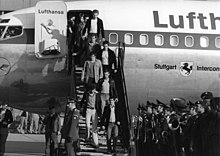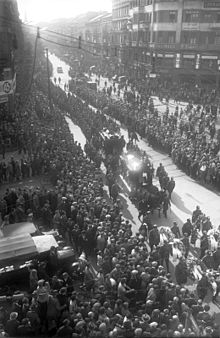Terrorism in Germany

Germany has experienced significant terrorism in its history, particularly during the Weimar Republic and during the Cold War, carried out by far-left and far-right German groups as well as by foreign terrorist organisations.
In recent years, both far left, far right and Islamist groups have been suspected of terrorism or terrorism plans.
Weimar Republic
Germany's loss in the First World War resulted in a chaotic situation, with multiple far-left and far-right organisations attempting to seize power. Both the far left and the far right organised their own militias, and carried out assassinations. For example, the Foreign Minister Walther Rathenau was assassinated in 1922 by a far-right group. Members of the Communist Party of Germany assassinated police captains Paul Anlauf and Franz Lenck in Berlin in 1931.
Terrorism in (or involving) West Germany and reunified Germany
During the Cold War, especially in the 1970s, West Germany experienced severe terrorism, mostly perpetrated by far-left terrorist groups and culminating in the German Autumn of 1977, the country's most serious national crisis in postwar history. Terrorist incidents also took place in the 1980s and 1990s. Some of the terrorist groups had connections to international terrorism, notably Palestinian militant groups, and were aided and abetted by the communist regime of East Germany.
| Known groups responsible for attacks in Germany | |||||||
|---|---|---|---|---|---|---|---|
| Red Army Faction
Held responsible for numerous bomb attacks, arson, kidnapping and murder of 34 people between 1970 and 1998. |
Revolutionary Cells
Held responsible for 296 bomb attacks, arson and other attacks between 1973 and 1995. |
Popular Front for the Liberation of Palestine | Black September | ||||
| Tupamaros West-Berlin | Movement 2 June | Anti-Imperialist Cell | Militante gruppe (mg) | ||||
List of significant terrorist incidents in Germany
| Germany | |||||||
|---|---|---|---|---|---|---|---|
| Date | Sub | Location | Deaths | Injuries | Type | Perpetrator | Description |
| 10 February 1970 | Munich | 1 | 11 | Grenade & Small arms fire | PDFLP (Palestinian nationalists) | -- Airports & airlines
| |
| 11 May 1972 | Frankfurt | 1 | 13 | Improvised Explosive Device | Red Army Faction | -- Government institutions (Foreign: United States Army)
| |
| 24 May 1972 | Heidelberg | 3 | 5 | Car bomb | Red Army Faction | -- Government institutions (Foreign: United States Army)
| |
| 5 September 1972 | Munich | 17 (5 perps.) |
- | Hostage taking
(2 days) |
Black September (Palestinian nationalists) | -- Olympic Games
| |
| 7 April 1977 | Karlsruhe | 3 | - | Small arms fire | Red Army Faction | -- Government institutions
| |
| 30 July 1977 | Oberursel | 1 | - | Small arms fire | Red Army Faction | -- Business
| |
| 5 September 1977 | Cologne | 5 | - | Small arms fire | Red Army Faction | -- Business
| |
| 27 September 1980 | Munich | 12 (one perp.) |
213 | Suicide bombing | Gundolf Kohler | -- Private citizens & property
| |
| 15 January 1982 | Berlin | 1 | 25 | Improvised Explosive Device | (Palestinian nationalists) | -- Private citizens & property
| |
| 25 August 1983 | Berlin | 2 | 23 | Improvised Explosive Device | ASALA (Armenian nationalists) | -- Diplomatic (French)
| |
| 1 February 1985 | Munich | 1 | - | Small arms fire | Red Army Faction | -- Business
| |
| 19 June 1985 | Frankfurt | 3 | 42 | Improvised Explosive Device | - | -- Airports & airlines
| |
| 8 August 1985 | Rhein-Main Air Base | 2 | 20 | Car bomb | Red Army Faction & Action Directe | -- Government institutions (Foreign: United States Army)
| |
| 4 April 1986 | Berlin | 3 | 231 | Improvised Explosive Device | Libyan agents | -- Private Citizens & Property
| |
| 9 July 1986 | Munich | 2 | - | Improvised Explosive Device | Red Army Faction | -- Business
| |
| 30 November 1989 | Bad Homburg vor der Höhe | 1 | 1 | Improvised Explosive Device | Red Army Faction | -- Business
| |
| 23 November 1992 | Mölln | 3 | - | Incendiary device | - | -- Private Citizens & Property
| |
| 28 April 1993 | Solingen | 5 | 14 | Incendiary device | - | -- Private Citizens & Property
| |
| 28 July 1995 | Cologne | 3 (one perp.) |
2 | Small arms fire & Hostage taking | - | -- Private Citizens & Property
| |
| 24 December 1996 | Frankfurt | 3 | 6 | Improvised Explosive Device | - | -- Religious figures & institutions
| |
| 2 March 2011 | Frankfurt | 2 | 2 | Small arms fire | Arid Uka
(Islamist) |
-- Government institutions (Foreign: United States Army)
| |
| 17 September 2015 | Berlin | 1 (one perp.) |
1 | Knife attack | -
(Islamist) |
-- Government institutions (Police)
| |
List of international terrorist incidents with significant German casualties
- 6 German nationals died as a result of the bombing of several Balinese tourist clubs in Indonesia on 12 October 2002.[35]
- 14 German nationals died as a result of the bombing of a synagogue on the island of Djerba in Tunisia on 11 April 2002.[36]
Response to terrorism
The terrorism of the 1970s has formed Germany's political culture and its policy of not negotiating with terrorists. It also led to the formation of the GSG9 counter-terrorism unit. In 1972, a law was passed, the Extremist Act (Radikalenerlass), which banned radicals or those with a 'questionable' political persuasion from public sector jobs.
In popular culture

A number of books and films address this topic.
Films
- Die Hard
- Brandstifter (Arsonists) (1969)
- The Lost Honor of Katharina Blum (1975)
- Germany in Autumn (1978)
- The Third Generation (1979)
- The German Sisters' (1981)
- Stammheim (1986)
- Todesspiel (1997)
- The State I Am In (2000)
- The Legend of Rita (2000)
- Black Box BRD (2001)[37]
- Baader (2002)
- Enemy of the State (2003)
- In Love With Terror (2003)
- Munich (2005)
- The Baader Meinhof Complex (2008)
- Children of the Revolution (2010)
See also
References
- ^ "Significant Terrorist Incidents, 1961-2003: A Brief Chronology". Office of the Historian: Bureau of Public Affairs. United States Department of State. Retrieved 8 February 2014.
- ^ a b c "2 Americans killed by car bomb at USAF base in West Germany". Schenectady Gazette. 9 August 1985. Retrieved 8 February 2014.
- ^ a b Varon, Jeremy (2004). Bringing the War Home: The Weather Underground, the Red Army Faction, and Revolutionary Violence in the Sixties and Seventies. University of California Press. p. 210. ISBN 9780520930957.
- ^ Desmond Butler; Mark Landler (9 September 2002). "THREATS AND RESPONSES: HEIDELBERG; One Terror Plot May Have Been Foiled, but a U.S. Base in Germany Is Still Vulnerable". The New York times. Retrieved 8 February 2014.
- ^ Moncourt, André. The Red Army Faction: A Documentary History. Projectiles for the people. PM Press. p. 178. ISBN 9781604861792.
- ^ Juan Sanchez (7 August 2007). Terrorism & Its Effects. Global Media. p. 144. ISBN 978-81-89940-93-5. Retrieved 16 December 2012.
- ^ The new dimension of international ... Google Books. 11 September 2001. Retrieved 22 June 2010.
- ^ Encyclopedia of terrorism . Google Books. Retrieved 22 June 2010.
- ^ The terrorist trap: America's ... Google Books. 18 July 1976. Retrieved 22 June 2010.
- ^ "Who Assassinated Siegfried Buback? Germany Revisits RAF Terrorism Verdict". Der Spiegel. 23 April 2007. Retrieved 10 February 2014.
- ^ Heinrich August Winkler (2007). Germany: 1933-1990. Oxford University Press. p. 318. ISBN 978-0-19-926598-5. Retrieved 13 September 2013.
- ^ "Dann gibt es Tote" (in German). Der Spiegel. 17 September 2007.
{{cite news}}: Unknown parameter|authors=ignored (help) - ^ "Neo nazis Arrested in Octoberfest Bombing". Beaver County Times. Associated Press. 28 September 1980. Retrieved 5 February 2014.
- ^ Gerber, Larry (29 September 1980). "Neo Nazi group suspected in Munich Oktoberfest bomb". The Lewiston Daily Sun. Retrieved 6 February 2014.
- ^ "Group claims responsibility for restaurant bombing". The Victoria Advocate. Associated Press. 16 January 1982. Retrieved 9 February 2014.
- ^ "FRENCH CONSULATE BOMBED IN BERLIN". The New York Times. 26 August 1983. Retrieved 7 February 2014.
- ^ "Guerrillas Kill Top West German Arms Executive". The Glasgow Herald. 2 February 1985. Retrieved 16 February 2014.
- ^ "BOMB AT FRANKFURT AIRPORT KILLS 3 AND WOUNDS 42". The New York Times. 20 June 1985. Retrieved 7 February 2014.
- ^ "ARAB GROUP ASSERTS IT PLANTED BOMB IN FRANKFURT". The New York Times. 22 June 1985. Retrieved 7 February 2014.
- ^ Tagliabue, John (9 August 1985). "CAR BOMB KILLS 2 ON A U.S. AIR BASE IN WEST GERMANY". The New York Times. Retrieved 7 February 2014.
- ^ Chalk, Peter (2012). Encyclopedia of Terrorism. Santa Barbara: ABC-CLIO. pp. 401–402. ISBN 9780313308956.
- ^ "Germans Get 3 Suspects In an Ice Cream Parlor". The New York Times. 4 August 1986. Retrieved 8 February 2014.
- ^ Tagliabue, John (26 July 1986). "CAR BOMB HITS A WEST GERMAN COMPANY INVOLVED IN 'STAR WARS'". The New York Times. Retrieved 8 February 2014.
- ^ Protzman, Ferdinand (1 December 1989). "Head of Top West German Bank Is Killed in Bombing by Terrorists". The New York times. Retrieved 8 February 2014.
- ^ Charles Hawley; Daryl Lindsey (24 August 2012). "Twenty Years after Rostock: Racism and Xenophobia Still Prevalent in Germany". Der Spiegel. Retrieved 20 September 2015.
- ^ Kinzer, Stephen (4 June 1993). "Thousands of Germans Rally for the Slain Turks". New York Times. Retrieved 20 September 2015.
- ^ "Neo-Nazi Asks Forgiveness for Death of Turks". New York Times. 14 April 1994. Retrieved 20 September 2015.
- ^ Williams Walsh, Mary (29 July 1995). "Gunman, 2 Others Killed in German Bus Hijacking : Europe: Police storm tour vehicle, which held 25, after seven-hour standoff. One hostage and a police officer are wounded". Los Angeles Times. Retrieved 20 September 2015.
- ^ "Christmas Eve Bomb Kills Three At Church". The Spokesman-Review. 25 December 1996. Retrieved 13 February 2014.
- ^ "Church Bomb". Milwaukee Journal Sentinel. 25 December 1996. Retrieved 13 February 2014.
- ^ "US soldiers shot dead in Germany". Al Jazeera English. March 2, 2011.
- ^ Pidd, Helen (3 March 2011). "Frankfurt airport shooting may have Islamist link, say police". The Guardian. London. Retrieved 6 March 2011.
- ^ "Frankfurt airport shooting: Jammed gun 'saved lives'". BBC News. 4 March 2011. Retrieved 6 March 2011.
- ^ "'Islamist' shot dead in Berlin after knife attack on policewoman". Deutsche Welle. 17 September 2015. Retrieved 20 September 2015.
- ^ Park, Andrew (10 October 2012). "Bali bombings: Full list of victims' names". SBS Australia. Retrieved 28 June 2015.
- ^ "Al-Qaeda claims Tunisia attack". BBC News. 23 June 2002. Retrieved 29 June 2015.
- ^ Der Baader Meinhof Komplex vs RAF Film Chronicle by Ron Holloway, accessed 19 April 2009
